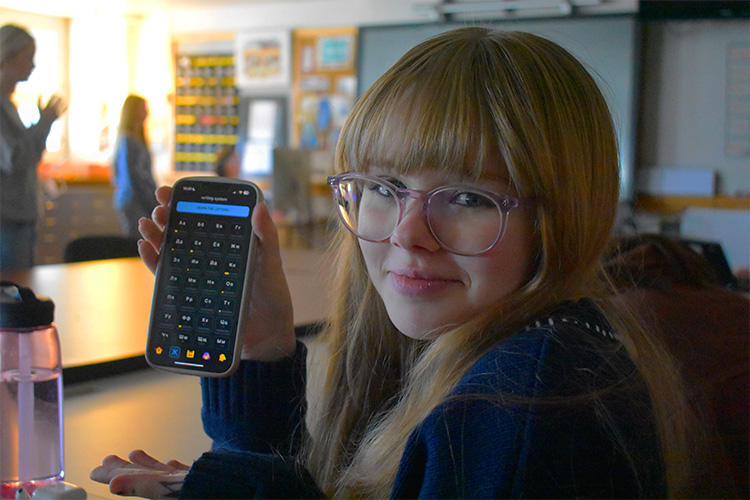
Russian phonetics and characters can be complicated - but fun to figure out. photo by Evelyn Jackson
Russian is a complicated language for a native English speaker to learn, but a worthy challenge all the same.
In the fallout of a bad breakup over the summer, I needed something to occupy my mind and take up my time, so I took up the task of learning Russian. I’ve always wanted to learn Russian, so I loaded up Duolingo and started my first lesson. I soon realized that I might’ve been in over my head. The language has an alphabet that barely begins to resemble the English alphabet I know so well, so wrapping my head around the characters in front of me took a lot longer. Luckily, the Duolingo interface features an alphabet tab for the languages with extensive and unfamiliar characters. I began to study the sounds of each letter and memorize the way these new symbols looked. Still often when writing Russian, I have to tell myself in my head “You use the ‘n’ and then the other ‘n.’”
There are a lot of symbols I’ve found to resemble the letters I know, with minor differences like accents or rounding. Despite this thought process, I would not say I am acquiring the alphabet as well, as I have mostly only managed to acquire the sound of the words. Currently, I identify and comprehend Russian through familiarities with English. Spelling is harder than speaking for me, which is why I introduced my phone to the Russian alphabet and spend time each day writing sentences in my notes app, so I can practice my knowledge on those wee characters. I often think of the names of classmates or movie characters, spending my time scanning through the alphabet to find how the name would be written in Russian. Whatever exposure I can get of the language is something I seek out.
The grammar, however, is a different story. I understand most grammatical rules in the English language, but I struggle with the prepositions of Russian, such as the words at and by. Just like in most other languages, a preposition in a sentence changes the form of the words around it. The order and present participles shift depending on the preposition involved. The past participle is less of a problem for me, as the way you write in the past is more intuitive.
Something in my journey that I’ve found particularly disheartening is how quickly I can complete my French lessons in comparison to my Russian lessons. There are some topics and words that I fully understand and can do on a level close to my French proficiency, but most lessons take me more than two minutes to complete. The grasp I have on French is nearing fluent, but in the Russian language, I’m closer to the level of a three year old.
I have not been giving myself much grace throughout this journey. I am constantly hard on myself each time I get a pronoun wrong, but I had the same problem when learning French. The difference, though, is that I had a class with a native speaker every day. Duolingo tries to get you to memorize until you can acquire the language, but the French class I’ve been taking for the last four years gave me exposure to real life conversations with topics teenagers are actually interested in and use in their everyday life. I’ve been browsing through different Russian-made media in an attempt to find a resource interesting enough to help me acquire the language, though the range is not as large as French shows and movies. Russian music is a helpful tool for me as well. There is a wide variety of Russian songs and artists on Spotify who use a mix of English and Russian in their music, which helps me with code-switching and gives me context clues.
Some days I do not have the energy to attempt any Russian, so I’ll choose to just do my French lesson to revitalize my streak. As I am taking French 4 Honors, I have dreams in French and often think sentences in French; I someday hope to be able to do that with the Russian language.